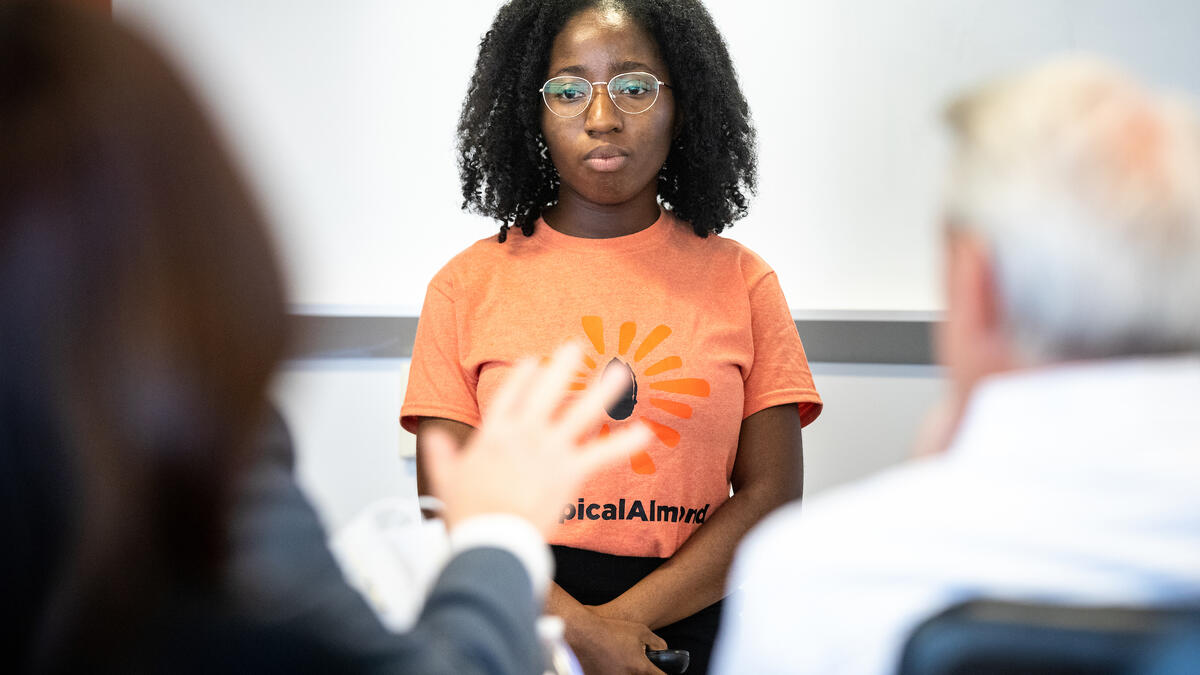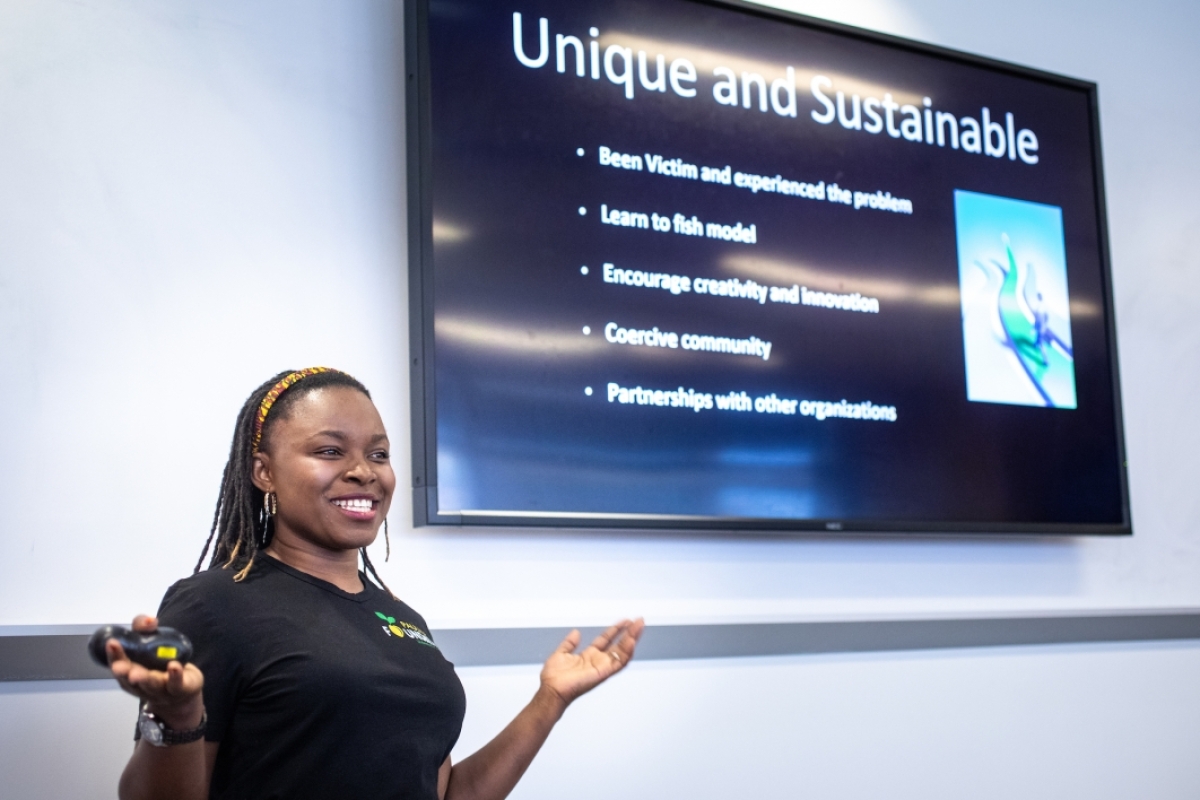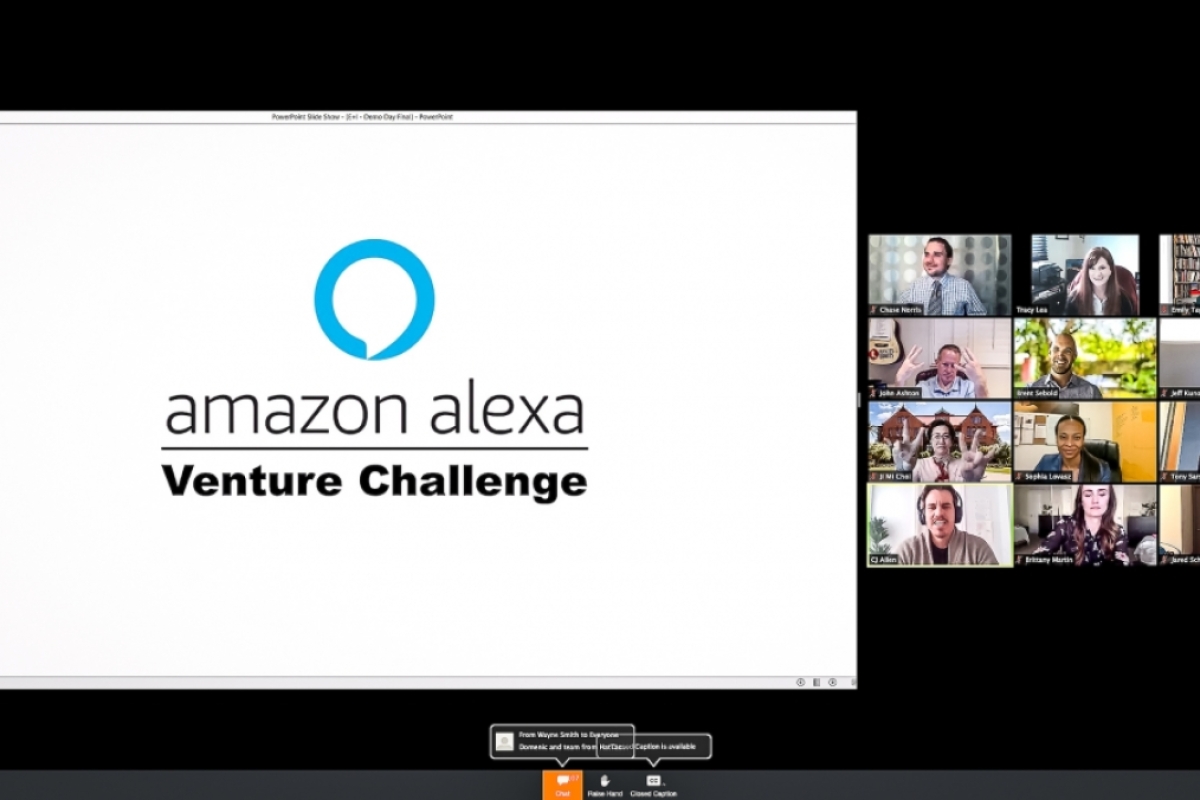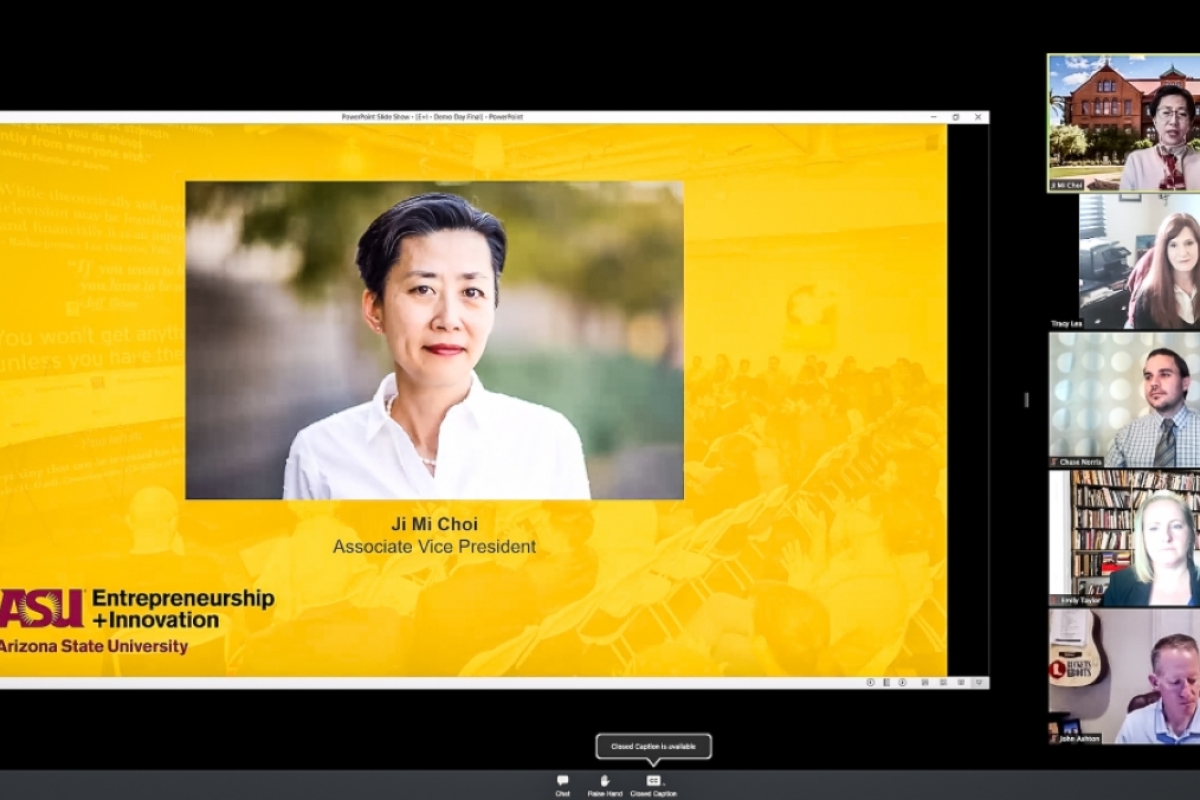Sometimes even a small amount of money makes a huge difference. An Arizona State University student took the $4,000 that she won in a Demo Day competition a year ago and created a company in her native Ghana to help feed children.
Already successful, Freda Sarfo, a master’s degree student in global logistics, won another $5,000 at last week’s Demo Day entrepreneurship competition, which she’ll use to expand her social enterprise, called Tropical Almond.
Like most everything else this semester, Demo Day was held online. At a typical Demo Day event, the founders pitch to a panel of judges at SkySong in Scottsdale throughout the day, and an awards ceremony is held in the evening. This semester, 85 ventures put together five-minute video pitches, which the judges reviewed last week. The awards were announced during an online presentation on May 1.
In her pitch video, Sarfo described growing up with a single mother in Ghana, where 1 out of 7 children dies of malnutrition. Women have few job opportunities to support their families.
The area is lush with tropical almond trees (different from the sweet almonds found in the United States), which produce hard-shelled nuts. Because the trees are planted for shade, the nuts often go to waste. Children become adept at shaking the trees to get at the nuts.
“Tropical almonds were our favorite and we were never hungry,” she said in her video.
In 2017, Sarfo came to ASU as a Mastercard Foundation Scholar, where she launched her business, Tropical Almond. With the $4,000 she won last year, she built a small processing facility in Ghana. She pays women to collect and crack the fallen nuts, which are then cold pressed. The oil is packaged and sold as a hair product for black women. The nut byproduct is processed into nutritious snacks. For every bottle of almond oil sold, one bag of high-protein snacks is donated. In the first three months, she sold 350 bottles through her online store.
Sarfo hopes to eventually start a tropical almond orchard in Ghana to produce a reliable source for the oil and more jobs.
“We’ve been able to feed over 100 kids with our protein-dense snack,” she said. “Through our outreach program, where we educate people on the benefits of the trees, we have been able to prevent more than 1,000 trees from being cut down and provide revenue for over 100 single mothers.”
Sarfo’s prize was among the more than $312,000 that was distributed during the Spring 2020 Demo Day online awards ceremony.
Unique circumstances like the pandemic fuel innovation, and that’s when ASU entrepreneurs step up, said Ji Mi Choi, associate vice president of entrepreneurship and innovation at ASU.
“No one is saying, ‘We’ll hunker down and see you on the other side when this is over,” she said during the awards event.
She described one major effort: Teams at ASU, led by the interdisciplinary Luminosity Lab, have stepped up to address the crisis by creating an online platform, called the PPE Response Network, to match hospitals that need safety gear to people, organizations and businesses that can make the items with 3D printers, she said.
In addition, the Devils Invent hackathon pivoted to help during the pandemic. Normally, it’s a 48-hour event in which teams work on several problems. But this semester, it was converted to an online format in which everyone worked on one problem for Banner Hospital — how to control visitors and still provide information to patients’ families. The hospital is now working with two student teams on refining their ideas.
“We’ve been tested in real time and we can say, ‘Yes, we’ve been having a positive impact,’” Choi said.
All of the startups who pitched at Demo Day are part of Venture Devils, the umbrella for funding, space and mentorship in the office of Entrepreneurship and Innovation at ASU.
The winning ventures from this semester’s Demo Day:
Amazon Alexa Venture Challenge: There were two $10,000 winners: BisbeeBaby, a platform that collects data from baby products, and EqualComm, a technology that provides real-time American Sign Language interpretation or text captioning for audio events. EqualComm was launched by Dylan Lang, a computer science and business entrepreneurship major who is president of the “deaf Devils at ASU” student organization. Other winners were Parts Detect, $5,000, and Easy Voice and Morality, $2,500 each.
Ashton Family Venture Challenge: Dima Building Innovators, created by Andres Sandoval, a graduate student in systems engineering, won $10,000. He invented a device to make construction safer during plumbing installation.
Edson Student Entrepreneur Initiative: Three student-led ventures won $20,000 each: GreyDyne, a software platform to detect seizures from EEG data that was co-founded by accounting major Nathan Gottlieb; IMD Solutions, a health care technology created by a team of five ASU undergraduates majoring in biomedical engineering; and Storm Stick, a device invented by Jason Miller to decontaminate fire scenes. Other ventures that were awarded funding were NeXST Rehab, $15,000; Dext Technologies, VBeck and Navi Concierge Nurses, $10,000 each; and Stonne Products, Selleh Lake Restoration, PeerSquared, BigUp and Accelerated Cycles, $5,000 each.
eSeed Social Impact Challenge: The Pauline Foundation, started by Pauline Nalumansi, a graduate student in the Thunderbird School of Global Management, won $6,000. Nalumansi won $5,000 at the Demo Day last fall for the nonprofit she created to help empower at-risk youth in Uganda, her home country. Other winners in this category were Ahwatukee Christmas, a Christmas tree removal and donation business started by finance major Connor Hogan and engineering management major Dillon Newgaard, and Memory Glass, a facial-recognition device for people with impaired memories invented by mechanical engineering major Andrew Deros, $2,500 each.
eSeed Challenge Accelerator: The five $5,000 winners were Introhm, Blastr Wrapz, StreamWork, Prescient Technologies and Crystal Sonic. Other winners were Selleh Lake Restoration and Opti-Rims, $2,500 each, and Altion Security, $1,000.
Mastercard Foundation Scholars Program: Besides Sarfo, the other winners were Comprehensive Rehabilitation Services and Shine Gardens, $4,000 each; VBeck and Resin, $3,000 each; Mtendere Library, $1,500, and Suntaa Shea and FJ Breeds, $1,000 each.
Phoenix Rising Venture Challenge: This was a new competition funded by ASU’s Global Sport Institute in collaboration with Phoenix Rising, which was seeking ideas that would promote the soccer team. Hat-Tec, a customizable hat storage and display hanger, won $15,000 and a beta test with the team. The founder, Domenic Fotino, earned a degree in technological entrepreneurship and management from ASU. Rachel Masterson, a student in the Thunderbird School of Global Management who created a venture called Futbar, won an offer to create a collaborative event with the team.
Retail Devils: This challenge is funded by Follett and was started as a pathway for student entrepreneurs to get their creations into the Sun Devil Bookstores. Winners were Better Family Products, $5,000; Strax Gear, $3,000, and Bare Sprouts, $2,000.
Sarsam Family Venture Challenge: Padma Agrobotics won $15,000 for its invention of weed-killing robots. Compass for Courage won $10,000. Ryan Stoll, a postdoctoral scholar in the psychology department and co-founder of Compass for Courage, has won thousands of dollars in previous venture competitions. Compass for Courage makes an interactive curriculum for children that uses board games to help them learn skills to overcome anxiety.
C.J. Allen, who earned an MBA at ASU in 2009 and is senior manager for the Alexa Smart Home program at Amazon, was one of the Demo Day judges.
“The virtual format changed the experience as a judge and changed the way we were able to connect with teams,” he said. “But what didn’t change was the quality of the ideas and pitches. I leave truly inspired by everyone.”
Top image: Freda Sarfo, a master’s degree student in global logistics, won $5,000 at last week’s Demo Day for her venture, Tropical Almond, a social enterprise based in Ghana. She's shown here pitching at the 2019 Demo Day. Photo by Charlie Leight/ASU Now
More Business and entrepreneurship
W. P. Carey School of Business celebrates new center and degree program for real estate, a vital industry for the state
As Arizona grows, so does the demand for places to live, work and connect. And with over 14% of the state's gross domestic product attributed to the real estate market, it's a crucial industry for…
Sustainability leader and ASU alum honored for transforming business with a people-first approach
Long before Jim Fish ('86 BS in accountancy) became president and CEO of WM — formally Waste Management — in 2016, he recognized that the higher he climbed the corporate ladder, the greater the…

ASU business students take on the big leagues
Each year, sports fans from across the country flock to Arizona to attend major events like the Waste Management Phoenix Open, Fiesta Bowl and Cactus League Spring Training. These mega-events…





